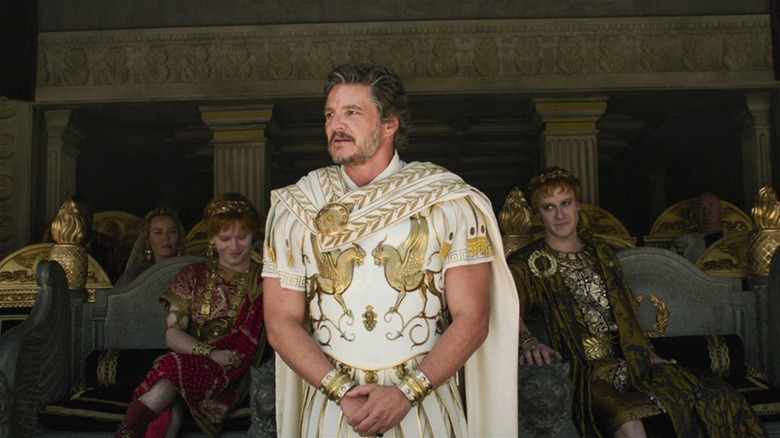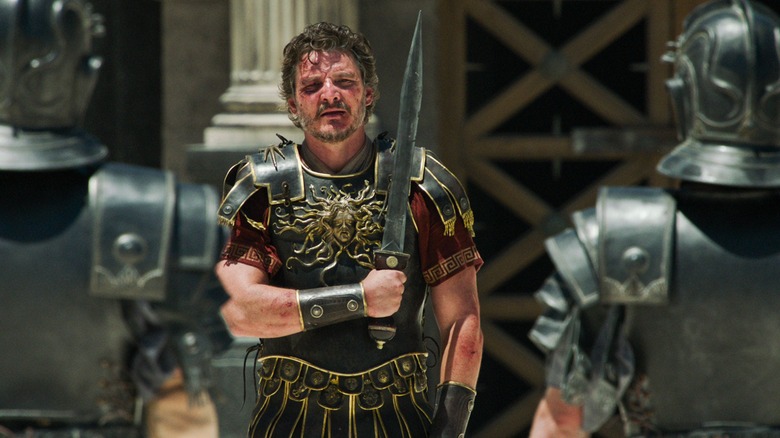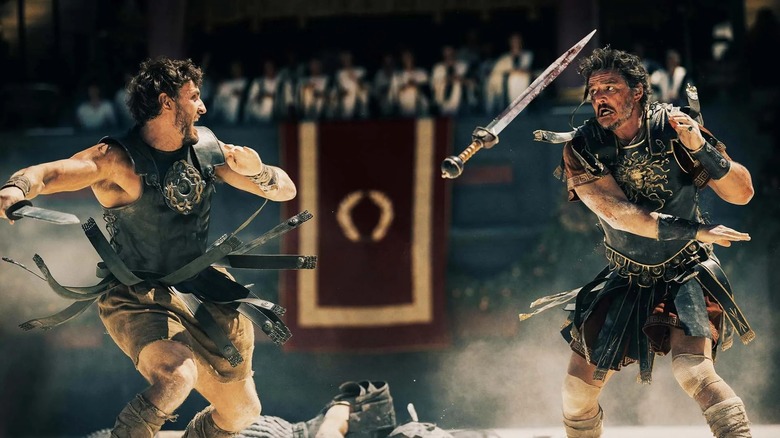Pedro Pascal's Gladiator 2 Character Is The Movie's Very Necessary Wild Card
This post contains massive spoilers for "Gladiator II."
When Pedro Pascal's Marcus Acacius is first introduced in "Gladiator II," he is seen barking orders to his naval fleet en route to the seaside province of Numidia. The intent is to wage war and conquer this land at the behest of sibling emperors Geta (Joseph Quinn) and Caracalla (Fred Hechinger), who revel in lawless tyranny because they can. As the events of "Gladiator II" take place 16 years after that of "Gladiator," the hard-earned political reforms brought about by Maximus (played by Russell Crowe in the original) before his death have been discarded over time. Rome has lost its way once again, and we are initially led to believe that General Acacius is nothing more than a vicious warmonger, happy to do the emperors' bidding. However, just like that of Lucius/Hanno (Paul Mescal), our first impression of him could not be more wrong.
In Lucius' defense (who is still unaware of his identity as Maximus' son at this point), Acacius' aggressive battle strategies paint a picture of a man who is shrewd and unfeeling. When Acacius' men are unable to drop the drawbridge to lead an attack on the Numidian soldiers, he is quick to take the initiative and do it himself. During the battle, Acacius notices a proficient female archer, who happens to be Lucius' wife, Arishat (Yuval Gonen), taking down his men, and immediately barks an order to have her killed. Arishat dies, which becomes the catalyst behind Lucius' simmering rage, which he unleashes whenever he is pitted against man or beast as a gladiator.
For a significant chunk of "Gladiator II," Acacius is oblivious to this rage directed at him until he is made aware of Lucius' true identity by his wife, and Lucius' mother, Lucilla (Connie Nielsen). Acacius' eventual fate quite literally triggers the climax of the film, but even up until this turning point, he emerges as a necessary wild card willing to tip the status quo in favor of a free Rome.
Pascal's Acacius brandishes a hidden vulnerability in Gladiator 2
The first glimpse into Acacius' true nature is offered when he addresses the Numidian prisoners of war in expectedly blunt terms, but quietly grieves the fallen. Even when he returns to Rome while being hailed as a hero in the streets, he seems visibly uncomfortable with the fanfare and actively sidesteps Geta's attempts to rile him up. This is a man who is tired of the brutality of war and just wants to spend time with his wife, but the emperors are quick to remind him Lucilla's continued existence is an act of mercy, considering her political heft. Moreover, when Geta talks about Acacius leading future conquests, he emphasizes the needs of the masses over a limitless thirst for power.
From here, a plot to overthrow the tyrannical emperors is hatched because Acacius insists to Lucilla that it is time for Rome to be reborn again. While this is reason enough for the Senate to take action, Geta and Caracalla's gleeful endorsement of brutal gladiator matches adds urgency to this plan, especially with Lucilla's realization that Hanno is Lucius, her long-lost son. Acacius' disdain for these matches is made clear from the get-go when he addresses the masses at the Colosseum. Without beating around the bush, he firmly urges them to be brave during times of upheaval, making it clear that he shares values championed by the forgotten hero Maximus and the Roman emperor Marcus Aurelius.
While Lucius emerges as the emotional center of "Gladiator II," as we are privy to his rage, grief, and yearning, Acacius is introduced as his foil only to be revealed as an honorable man with sincere intentions. Later, Lucius realizes this a bit too late and refuses to kill Acacius when they're forced to fight each other, but fate has other plans for Acacius, the beloved hero of Rome.
Acacius' death paves the path for Lucius' pyrrhic victory
After the Senate's plot to overthrow the two emperors is thwarted thanks to the charismatic, conniving Macrinus (Denzel Washington), Acacius is punished and forced to fight in the Colosseum and is ultimately pitted against Lucius (who is pumped up with the need to exact revenge). However, the emperors underestimate the crowd's loyalty towards Acacius — whom they trust more than their rulers — and fail to anticipate the public revolt after they pierce the beloved Roman general with a dozen arrows. Lucius' rising popularity as Macrinus' gladiator adds fuel to the fire, as he passionately asks the crowd how their emperors would treat them if they didn't hesitate to kill their favored general in cold blood. Once this happens, the stage for unbridled chaos is set.
The popular trope of the protagonist successfully enacting revenge is subverted in favor of a more impactful "antagonist" death, where the target of revenge is reframed as a tragic hero whose life is cruelly cut short. Acacius' love for Lucilla prompts him to attempt to free Lucius, and he fulfills his promise to protect him even in the arena, where he surrenders and refuses to fatally fight him. Acacius was ready to die for Lucius' sake in that arena, and this honorable sentiment being pierced with arrows spells doom for everyone involved.
In the end, Lucius emerges victorious, as he manages to take down Macrinus without sacrificing innocent lives to war. However, this fresh chapter feels incredibly hollow, as Lucius has no one left to fight for, except the people of Rome. Just like Maximus' death in "Gladiator," Acacius' demise joins a long list of cruel sacrifices made in honor of a better, freer future, even though the cogs of cyclical regimes of peace and tyranny are bound to keep turning through time.


